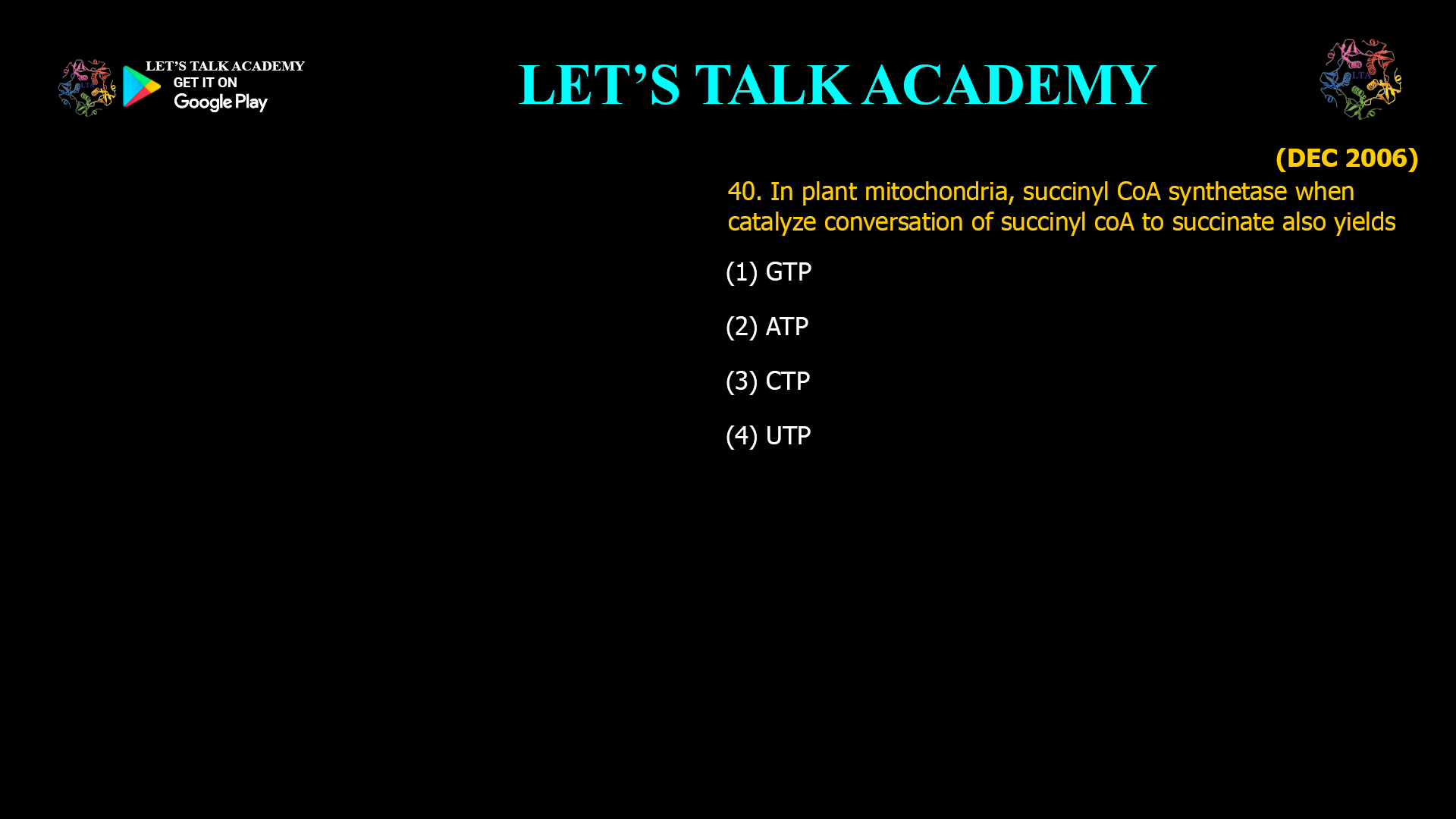- In plant mitochondria, succinyl CoA synthetase when catalyze conversation of succinyl coA to succinate also yields
(1) GTP (2) ATP
(3) CTP (4) UTP
Succinyl-CoA synthetase (also called succinate-CoA ligase) is a key enzyme in the tricarboxylic acid (TCA) cycle that catalyzes the reversible conversion of succinyl-CoA to succinate. This reaction is unique because it is coupled with substrate-level phosphorylation, producing a nucleoside triphosphate molecule. However, the specific nucleoside triphosphate produced can vary depending on the organism and tissue.
This article explains which energy-rich molecule—ATP or GTP—is generated by succinyl-CoA synthetase in plant mitochondria during this reaction.
Succinyl-CoA Synthetase Reaction
The enzyme catalyzes the reaction:
Succinyl-CoA+NDP+Pi↔Succinate+CoA+NTP
-
NDP: Nucleoside diphosphate (either ADP or GDP)
-
NTP: Nucleoside triphosphate (either ATP or GTP)
This means the enzyme can produce either ATP or GTP depending on the specific isoform and organism.
ATP vs. GTP Production
-
In mammals and many eukaryotes, including plants, succinyl-CoA synthetase predominantly produces ATP in mitochondria.
-
In some organisms, such as certain bacteria and mammals (e.g., liver), the enzyme produces GTP instead.
Evidence for ATP Production in Plant Mitochondria
-
Studies on plant mitochondrial enzymes indicate that succinyl-CoA synthetase produces ATP rather than GTP.
-
This ATP generation contributes directly to the cell’s energy pool via substrate-level phosphorylation, complementing oxidative phosphorylation.
Summary Table
Organism/Context Nucleoside Triphosphate Produced by Succinyl-CoA Synthetase Plant mitochondria ATP Mammalian mitochondria GTP (some tissues) or ATP (others) Bacteria Varies (can be ATP or GTP) Conclusion
In plant mitochondria, succinyl-CoA synthetase catalyzes the conversion of succinyl-CoA to succinate with the concomitant production of ATP via substrate-level phosphorylation.
Correct answer: (2) ATP
-




26 Comments
Kirti Agarwal
September 18, 2025ATP in higher eukaryotes
Neha Yadav
September 20, 2025ATP
Sonal Nagar
September 22, 2025ATP.
Dharmpal Swami
September 23, 2025ATP
Anurag Giri
September 23, 2025Atp
Manisha choudhary
September 23, 2025Plant cell m ATP
Mammals m kuch tissue ,liver m GTP other ATP
Bacteria m Varey krta h GTP or ATP
Pallavi Ghangas
September 23, 2025atp
Aakansha sharma Sharma
September 23, 2025Plant cell m ATP
Heena Mahlawat
September 24, 2025ATP
Roopal Sharma
September 24, 2025Atp productive in plant cell
Nilofar Khan
September 24, 2025Correct answer is ATP
Deepika sheoran
September 24, 2025ATP
Minal Sethi
September 24, 2025In plant mitochondria ATP is formed instead of GTP
Soniya Shekhawat
September 25, 2025In plant production of ATP in mitochondria.
Mohd juber Ali
September 25, 2025(In plant mitochondria )succinyl-CoA to succinate production of ATP (substrate level phosphorylation.)
Muskan singodiya
September 25, 2025ATP
Kavita Choudhary
September 26, 2025In plant mitochondria succinyal co synthesize when conversion os succinyal – co -enzyme to succinate it’ yields ATP
Avni
September 26, 2025In plant mitochondria, the conversion of succinyl-CoA to succinate with the production of ATP
Varsha Tatla
September 27, 2025ATP
Arushi Saini
September 27, 2025plant mitochondria )succinyl-CoA to succinate production of ATP (substrate level phosphorylation
Payal Gaur
September 27, 2025ATP
Kajal
October 2, 2025ATP
Muskan Yadav
October 3, 2025In plant mitochondria, succinyl-CoA synthetase catalyzes the conversion of succinyl-CoA to succinate with the concomitant production of ATP via substrate-level phosphorylation.
Correct answer: (2) ATP
Santosh Saini
October 5, 2025In plant mitochondria, conversion of succinyl Co-A to succinate produce ATP through substrate level phosphorylation
Khushi Vaishnav
October 7, 2025ATP
Sakshi Kanwar
November 26, 2025ATP